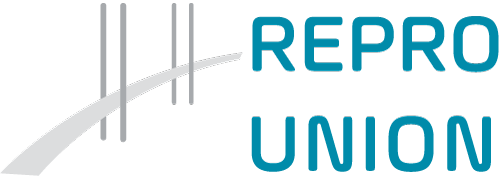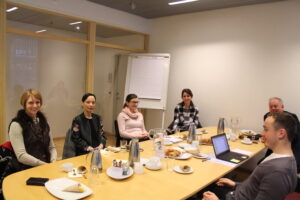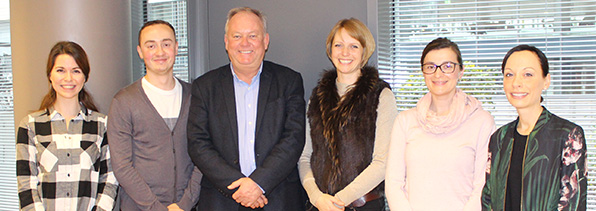ReproUnion Program Dicrector, Stig Jørgensen met with our ESHRE fellowship recipients to talk about their experience in Denmark, and how their introduction into the ReproUnion program has been.
Where are you from and what is your professional background?
Dr. Sladjana Malic Voncina, Ljubljana, Slovenia.
As a medical doctor specialized in the field of Gynecology and Obstetrics, I was always deeply inspired by reproductive medicine and was inspired by the statement “science is the key to overcome infertility”. Last year, I finished my PhD researching on for intriguing topics, such as how male infertility factor vectoring damaged sperm DNA to developing embryo influences couple’s prospects of conception.
Dr. Emily Koert, Vancouver, Canada.
Registered Psychologist in area of reproductive health and infertility
PhD in Psychology, University of British Columbia, Canada
Post-doctorate with Cardiff Fertility Studies Research Group, Cardiff University, Cardiff, UK
I have conducted research and published in the areas of fertility awareness and the development and efficacy of online fertility education strategies along with the psychological impact of unintentional childlessness after delayed childbearing.
Dmitry Kikiforov, PhD student, Italy, Abruzzo region.
My background includes two years of academical science research in the field of reproductive medicine and three years of experience in clinical embryology at IVF clinic.
Eva Alexopoulou, Greece.
I am a biologist with a specialization on assisted reproductive technologies. I have been working as a trainee-embryologist for the last two years in Greece and this amazing journey is still in progress at the Fertility Clinic at the Hvidovre Hospital.
Why did you choose to enter a research program in the Nordic countries?
Dr. Voncina: I was inspired by Professor Aleksander Giwercman and his research group work and results. After meeting him on a conference and having the opportunity to discuss about connections between our fields of interests, I was motivated about his initiative to apply for ESHRE/ReproUnion collaborative fellowship.
Dr. Koert: Internationally, countries like Denmark are seen as world leaders in implementing family-friendly policies and providing structural support that facilitates the achievement of family and childbearing goals. There is much to be learned by their example by those of us from countries without such policies. Researchers from the Nordic countries are internationally renowned for their innovation and groundbreaking studies and dedication to training and mentorship of early career researchers. The ESHRE/ReproUnion partnership provides a unique opportunity to benefit from this rich environment.
Kikiforov: Before I applied for this ESHRE/ReproUnion program, I knew about Professor Claus Yding Andersen and the Laboratory of Reproductive Biology. The main topic of my PhD research is ovarian tissue cryopreservation and oocyte production from the tissue, so there were not any better places for me to have this fellowship than LRB.
Alexopoulou: Nordic countries are famous for the great register database, the innovative studies and their effort to improve their daily work in a way that it is patient-friendly but at the same time scientifically updated. These reasons were among my motivations for choosing a research program in the Nordic countries for my further education.
Can you tell us about what your research project in the ESHRE/ReproUnion program is about?
Dr. Voncina: The main project in which I am involved in is about “Clinical impact of sperm DNA damage on the ART success outcomes mainly cumulative live birth and miscarriage rates – Analysis of Swedish tertiary fertility center database” collaborating with Amelie Stenqvist PhD student under supervision of Professor Aleksander Giwercman. There are two more projects that I am also interested in and willing to be a part of, which are about clinically and scientifically important issue which connects recurrent miscarriage after spontaneous conceiving to male DFI levels; as well as serum anti-Müllerian hormone (AMH) with its and other paracrine and endocrine potential biomarkers concentration from follicular fluid and clinical implications in couples who were included into artificial treatments in collaboration with Professor Claus Yding Andersen from Rigshospitalet, Denmark.
Dr. Koert: I am spending 6 months working in the Fertility Assessment and Counselling (FAC) clinic in the Rigshospitalet, Copenhagen under the joint supervision of Professor Anders Nyboe Andersen, Professor Lone Schmidt (Department of Public Health, University of Copenhagen) and Kathrine Petersen, M.D., Ph.D. (Holbaek Hospital). The FAC clinic was established in 2011 to offer free counselling to men and women to improve prediction and protection of fertility and to reduce the need for fertility treatments. A 5-year mixed-method follow up study is being conducted at the FAC clinic to assess the effectiveness and impact of the program. I am developing, collecting and analysing data in the qualitative portion of the study which is examining the impact and experience of the counselling. I am also collaborating with Randi Sylvest, PhD student at Hvidovre Hospital, Fertility Clinic and Department of Public Health, on the analysis of two studies on men’s family formation preferences and experiences before and after fertility counselling at the FAC Clinic.
Kikiforov: Thanks to the good supervision at the host laboratory and support of my colleagues, I have managed to join some different projects during my fellowship. The main one is about isolation of pre-antral follicles and their in-vitro culture. Also, I am taking part in researches aimed on improving the outcome of ovarian tissue cryopreservation and comparison of different methods of tissue freezing.
Alexopoulou: The purpose of our retrospective study was to examine early embryo morphokinetics parameters and odd cleavage patterns between two groups with a lower and normal response to the ovarian stimulation respectively. We used EmbryoScope (Vitrolife), which is the world’s most used time-lapse system for observation of embryo development.
What advantages do you see being a part of a research program located in Denmark and Sweden?
Dr. Voncina: It is a great opportunity to research in such advanced environment with an impressive learning curve. Firstly, I was introduced in Reproductive Medicine Centre Malmö and was kindly involved from first hour in reproductive medicine clinical practice from the first visit of patients who are coping with infertility problems until deciding about their treatment possibilities and further involvement in the artificial treatments. Secondly, following of medical doctors who are specialized in the field of reproductive endocrinology and field of andrology I am learning about another important segment of female and male fertility problems with taking into account their general health. I was also allowed to examine patients and ultrasound examination. Obtaining biological materials after controlled ovarian stimulation after using the most suitable protocols in which I was involved was the only one more step for improvement of my knowledge and skills. The time-lapse technology and good-clinical practice approaches in IVF and laboratory was an additional aspect for picturing of whole process functioning. I have learned how to perform Sperm Chromatin structure assay – SCSA. Analyzing large database of fertility tertiary center is a smart step for improving public infertility supporting system. Meeting researchers and experts from the Oresund Region with whole collaborating idea brings us new opportunities and a clearer picture of our future goals and senses how to use science in the proper way overcoming infertility problems with focusing on the future most suitable treatments of infertility. Connecting with scientists who have wide open eyes gives me strength for new achievements.
Dr. Koert: The fellowship offers an incredible opportunity to spend 6 months in Denmark in a ReproUnion training site and widen my exposure to an international research group. The fellowship facilitates the sharing of knowledge, generation of innovative research, and solidification of long-term collaborations that will benefit my development as an independent researcher and create new possibilities for future research.
Kikiforov: It is clear for me that by being a part in the Danish research network it is easy to have access to all latest investigations in human reproductive medicine and work on the edge of developing fields. The organization of work and a working style by itself certainly facilitates the obtaining of good results.
Alexopoulou: Being part of a great scientific team for the last three months in Denmark, I had the opportunity to see how a well-organized working schedule facilitate your daily life and improve your performance. Additionally, having always access to updated databases collected from a number of different hospitals gives you the opportunity to investigate a variety of scientific issues for a more randomized sample.
Can you describe how your research project can contribute to solve the increasing number of infertility issues in Europe today?
Dr. Voncina: With a strong belief, the final research results will influence and add to clinician’s awareness how male infertility through damaged genetic material is influencing artificial treatment outcomes as well as natural conceiving prospects of couples. Male infertility is still neglected and more efforts are needed to reach the correct approaches. Sperm DNA damage testing is well researched scientific field where acceptable, uniform and well applicable conclusion is still not yet achieved. It might be intriguing as a consequence of proper individuals included or not so powerful statistical methods applied. To my knowledge, this would be the largest study that will be able to answer on many (and ongoing) debatable questions connecting paternal impact on artificial treatments success outcomes and later on offspring health.
Dr. Koert: The FAC clinic was developed in order to prevent infertility and decrease the need for fertility treatments. The 5 year follow up study will allow us allow us to determine the impact of the FAC clinic services from the patient’s perspective, providing important insights into what is working, what needs to be altered, how the assessment has influenced the individual’s subsequent fertility decision-making and parenthood planning. This information will inform the provision of effective service and support to women and men attending the clinic in the future. If people have a better understanding of risks to fertility and how long they can safely delay parenthood, they may be less likely to wait until they require medical intervention to conceive.
Kikiforov: The project, in which I am taking a part, is aiming women who is suffering from cancer of another types of diseases, when gonadotoxic therapies are required. Our goal is to provide fertility options for all types of patients after chemotherapy/radiotherapy, as well as restore an ovarian organ function for those patients.
Alexopoulou: It is the first research which tries to elucidate with the use of a time-lapse system (TLS-EmbryoScope, Vitrolife) the developmental potential of embryos derived from women with a lower ovarian response. Improved knowledge on embryo quality in this patient population may guide clinicians whether the patient still has a chance of conceiving using her own oocytes or if she should be advised to go to egg donation.
As you probably know, ReproUnion is world leading in overcoming infertility. How do you see your research program that you are part of can contribute to accelerate to reach that vision?
Dr. Voncina: Using such a wide collaborative, methodologically and clinically well-designed studies with the opportunity of including people from different backgrounds, knowledge levels and the orientations will highly impact and raise awareness to a higher level.
Dr. Koert: By increasing awareness about fertility and assisted reproduction and personal fertility status, people can make informed decisions about when to start trying to conceive. Ideally this will reduce the number of women and men delaying childbearing and experiencing age-related infertility.
Kikiforov: As a unique network of collaborations in the capital region of Denmark and neighbor region in Sweden, ReproUnion already represents team of leading research and clinic facilities in reproductive medicine. The research projects of our laboratory are about very fast developing topics and certainly contributing a major part in the current state of the art in fertility preservation.
Alexopoulou: Overcoming infertility is not a one-way street. Each research contributes a lot to the accomplishment of that goal, which is the priority for all of us who are members of the human reproduction scientific community. Even though further investigation is required, with a bigger sample and more potential confounding factors, I strongly believe that my research project gives an unpredictable perspective regarding the developmental potential of embryos derived from patients with a lower ovarian response to a controlled stimulation protocol. If our results will be confirmed by a randomized study, maybe the creation of a morphokinetic model for both normal and lower responders could be used from embryologists for the selection of the best embryo for transfer. Additionally, patients with a lower response could be less stressful about the quality of their embryos, which is a feeling that makes the whole treatment more difficult for them.


